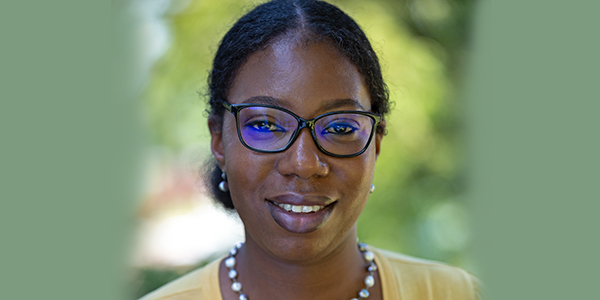Managing in an ever changing world
-
“Covid has taught us to be very flexible and to understand that no two people are exactly the same in how they deal with things,”
When Jocelyne Gayenga says she’s a people person it’s because she believes human connection builds a better world and a bit of kindness will count most if humankind is to emerge from the Covid pandemic with as few scars as possible.
The Manager for Strategic Development at the Sydney Brenner Institute for Molecular Bioscience moved swiftly to get staff and students equipped to work from home and to make sure they had internet access and support to work off-campus as the March 2020 lockdown was announced.
It’s what she does as the Institute’s “problem solver”, but she’s also the person many turn to for a shoulder to lean on and this earned her a nomination as one of the Wits Covid-19 Heroes.

“Most people didn’t have laptops so we were not prepared. But I managed to find spare laptops and arranged to have them signed out on time and we made sure everyone had internet connectivity,” she explains.
As the first 21 days of lockdown turned into more long weeks of hard lockdown it became clear people were battling not just from adjusting to working from home, but from isolation, anxiety and fear of the killer virus. Students were also worried that they would not finish their degrees on time and that even if they were granted extensions that their funding would run out.
“We were very honest with the students about what budgets we had to pay things like their stipends. Then we supported them to apply for other funding and tried to assure them that we were going to do our best for them,” Gayenga says.
On top of these worries students and staff were missing human connection and interaction with each other. International students especially, who could not make it back to their home countries, were especially vulnerable, she says.
“We set up something we called a Zoom Tea – every day at 10am we would log on and just see how everyone was doing,” Gayenga says of their virtual tea breaks.
She adds: “Before Covid lockdowns we also used to have a Friday meetings called General Club for staff and students to share and talk about their research and we would always have cake and tea afterwards. After six months of not doing these we decide do General Club online – even without the cake. These worked really well and now we have people from outside the Institute joining in, which means we are reaching a broader audience.”
For Gayenga it’s been about using the technology, but using technology to make sure everyone is included in a Covid-altered world.
“I think my management style is to be very approachable. I usually don’t even tell people that I’m the manager, so they feel we are at the same level – I just tell them my name and that I will try to help them,” she says.
Living in a changing world
Her five years in the role she says happened as a career detour. She has a Masters in Water Care with specialisation in biochemistry and microbiology. As a manager with a science background she says science should always take into account who it’s for; the people it impacts.
“We need more compassion, more openness and more emotional intelligence in the world,” says the mom of two daughters who believes her girls, like all children, deserve a better world to grow up in.
Gayenga arrived from the Democratic Republic of the Congo when she was seven. Growing up as the “different” child in a South African classroom and with migrant parents who were forced to walk away from a homeland, she understands people’s stories and life experiences are complex.
“Covid has taught us to be very flexible and to understand that no two people are exactly the same in how they deal with things,” she says.
It’s an attitude that has guided her interactions with the many people she comes in contact with. Gayenga also draws strength from her religion. Bible stories of people who survived terrible hardships through faith are her inspiration. Family support is also key. She enjoys going on nature walks with her husband and her large family (she’s one of eight siblings) or treating them with servings of her famous chocolate mud pie cake.
“It’s drenched in chocolate,” she says with a laugh. And one day, in the not too distant future, when she reunited with her “work family” her hope is to share cake and sweetness with them again.
About Wits Covid-19 Heroes
The Wits Heroes Series celebrates staff and students who went beyond the call of duty at the onset of Covid-19 in 2020. Wits Heroes were nominated by members of the Wits community. Discover other Heroes.

